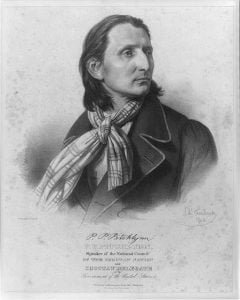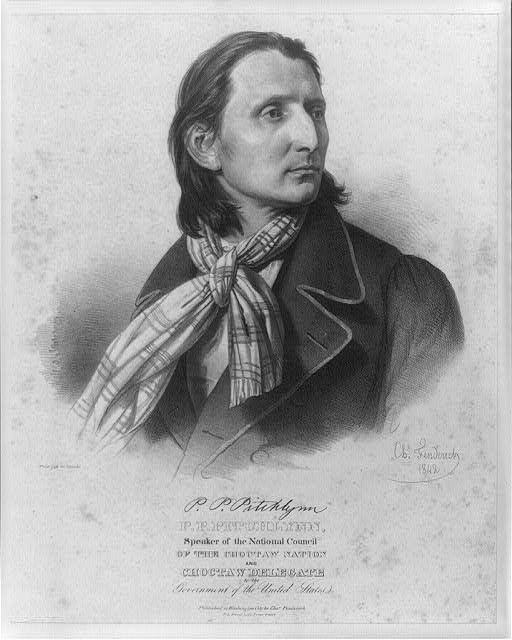Oktibbeha 1 county, Mississippi, as well as its sister counties, has been the scene of many hard struggles between the contending warriors of the different tribes, who inhabited the noble old state in years of the long past; not only from the statements and traditions of the Choctaws, who were among the last of the Indian race whose council-fires lit up her forests, and whose hoyopatassuha died away upon her hills, but also from the numerous fortifications and entrenchments, that were plainly visible, ere the ploughshare had upturned her virgin soil, and her native- forests still stood in their primitive beauty and grandeur. From those rude fortifications, plainly identified many years after the advent of the missionaries, strong positions were evidently held by each contending party; yet they seemed to have been constructed with no regard to mathematical skill, but rather as circumstances demanded or would admit. Such at least were the entrenchments enclosing the Shakchi Humma old fort; and the many evidences, such as rusted tomahawks, arrow-heads, human bones, teeth and fragments of skulls that were continually being ploughed up for many years, proved the hard contested fight of the Shakchi Hummas and the allied Choctaws and Chickasaws; and that the brave but greatly out numbered Shakchi Hummas had disputed every inch of the ground, and had only yielded to the superior numbers of the combined Choctaws and Chickasaw warriors. The ancient Choctaws, as well as all other Indians, did not confine their battles to forts and entrenchments, but fought as circumstances offered, oftener in small bodies than in large. Hence, they never drew out their forces in open field, but fought from behind trees, stumps and logs; each seeking every possible advantage of his enemy, regarding all advantages gained as wholly at to superior skill; all advantages lost, to want of it.
According to the statements made by the Choctaws to Mr. Calvin Cushman, when first established among them as a missionary, nearly eighty years ago, the Shakchi Hummas, a warlike and very overbearing tribe of Indians, were wholly exterminated by the combined forces of the Choctaws and Chickasaws about the year 1721.
I was personally acquainted with a remarkable old Choctaw warrior, by the name of Ish-iah-hin-la, (you liable to go) who claimed to have fought through the Shakchi Humma war. He was said to be the last surviving Choctaw warrior of that memorable conflict, and died in 1828 at the advanced age of 107 years, so he claimed to be. Indeed the old warrior’s white locks, wrinkled face, shriveled and decrepit body, indicated life’s journey to have reached that point; and, as longevity was frequent at that time (as even to-day) among the Indians, many then living whose ages reached eighty and ninety years. I did not doubt the old man’s statement. He took great delight in relating many incidents of that war and oft amused my boyish fancy in telling many thrilling scenes in which he participated. This war had its origin from the overbearing disposition of the Shakchi Hummas, and the frequent murders committed by their war parties upon the Choctaws and Chickasaws. The account, as related by the Choctaws to the missionaries, is in substance, about as follows: Many years after the Choctaws and Chickasaws had established themselves east of the Mississippi river, a Choctaw chief, named Shakchi Humma (Crawfish Red), recrossed the Mississippi river, with his family and a large number of his adherents, and established a colony (under the name of their chief, Shakchi Humma) in, now the state of Arkansas.
In the course of years this colony became greatly enlarged by constant accessions; and, with increasing numbers and strength, also became insolent and overbearing to that extent that a war arose between them and another tribe, in which they were defeated and driven back over the Mississippi to their former country. After being established there, (not as Choctaws but as Shakchi Hummas, disregarding their ancient kindred ties) they adopted an arrogant and aggressive policy towards both the Choctaws and Chickasaws, who, provoked beyond longer endurance, formed a secret alliance in an exterminating war against the Shakchi Hummas.
Then followed a three years war of extermination (famous in Choctaw tradition) culminating at the battle of Oski Hlopah and blotting out the Shakchi Humma nation. The Choctaws and Chickasaws took the warpath together, re solving to exterminate their insolent enemies or be exterminated themselves. At this juncture, several large parties of Shakchi Hummah hunters were camped on Noxubee creek, as much game had congregated there owing to the destruction of the range in many parts of the country by the accidental fall fires. The Choctaws, being aware of the locality of the Shakchi Humma hunters, opened the war by making an unexpected attack upon them and slew the greater part, throwing their dead bodies into the creek which caused; in awful stench, which gave the name Nahshobili to the creek, and opened hostilities in good earnest between the Choctaws and Chickasaws on one side and the Shakchi Hummas on the other.
Extermination being the war cry adopted by the contestants, both parties fought with desperation. But, un expectedly as the two allied tribes had rushed upon their unsuspecting- and unprepared enemies (thus in the outset gaining great advantage) yet the Shakchi Hummas soon rallied from their discomfiture caused by their surprise; and then commenced one of those fierce and bloody conflicts, so oft engaged in by the Red Men in the years of the holy past, but known only to themselves. In union there is strength, is an old but true adage; and thus it proved to the Choctaws and Chickasaws. Though fortune for a while appeared to waver, vacillating from the one side to the other and seeming” at a loss on whom to bestow her smiles, but finally looked with favor upon the two allied tribes. The Shakchi Hummas, after many reverses and great losses, finally sought to pro tract the strong struggle by taking refuge in their entrenched villages. But one after another of these fell into the hands of the victorious Choctaws and Chickasaws, who now had become fearless by their success, and, e re the third year of the desperate conflict had closed, every village had been taken, and destroyed, and the majority of the inhabitants slain. The few who escaped united their strength and finally took their last stand at a point now known as Lyoil’s bluff on Oski Hlopah (Cane stripped) river known now as Trimcane, about nine miles northeast of Starkville, Mississippi, hope less, yet determined to fight to the death. Sheltered by a few logs and banks of earth, the last of that once powerful and arrogant tribe, now fought as only men in despair can and do fight, sending many of their enemies to precede them to the hunting grounds in the great beyond. How true it is, that man is a being, when placed in danger and devoid of hope that oasis amid the arid desert of life who is to be dreaded! When hope has fled, despair usurps its place; and none despair till they behold death staring them in the face; and when life, with all its beautiful shades and colors, is bleached with the bitterness of death, tis then man becomes desperate; and even the most timid have then accomplished feats of daring seemingly incredible. Such was the forlorn hope cooped up in that little fort, if fort it might be called. Surrounded on all sides without the possibility of escape, and sheltered only by a few logs and piles of dirt; yet they baffled all attempts of their enemies to dislodge them.

Like tigers at bay, they fought day and night, though hour by hour thinned in numbers, till at last but few remained; yet that handful yielded not, nor asked for quarter singing their death song, and ever and anon hurling back their defiant war-whoops, they continued to fight, killing everyone who attempted to scale their little breast- work of logs and earth. For many days did the warriors of that log and mud fort successfully hold out, bravely driving back their assailants in every charge. At length, the Choctaws and Chickasaws, maddened at the obstinate resistance of the now desperate Shakchi Hummas, and the continued falling here and there of their own warriors, with a, mighty rush broke over the feebly defended walls of logs and earth, but to be met by the little squad of still defiant Shakchi Hummas, who received them with the last shout of their still defiant war-whoop. Then, for a few moments, was heard the clashing and ringing of the tomahawks as the busy scene of death went on; each Shakchi Humma warrior fighting, not for life or for glory, but in mad despair seeking to kill ere he was killed. But soon the last death-dealing blow was struck that blotted out forever the Shakchi Humma Nation. Only one of the whole tribe was left, and that one was a young girl about sixteen or eighteen years of age, who was spared on account of her wonderful beauty. She was adopted by the Choctaws, and lived to be nearly or quite a hundred years old, and was living some years after the advent of the missionaries among them. Mr. H. Peden, who lived fourteen miles from Hebron, the home of Mr. Calvin Cushman, stated that Mr. P. P. Pitchlynn, who had often spoken to him of this old Shakchi Humma captive, one day pointed-her out to him at a religious meeting of the Choctaws. Mr. Peden stated that she was the oldest looking human being that he had ever seen, and from her appearance, he judged her to be over a century old. She died a few years before the venerable old warrior, Stahenka; but lived to hear the tidings of the Cross preached to her race, though the only survivor of her own tribe, exterminated in the bright morn of her youthful but eventful life. Alas, the single combats of the heroes of history or fable may amuse the fancy and engage the admiration; the skillful evolutions of war may inform the mind; but in the uniform and terrible picture of a general assault, all is blood, horror and desolation; nor shall I further attempt to delineate, at the distance of nearly two centuries, a scene at which the actors themselves were in capable of forming any just or adequate idea. But such is the only history of the Shakchi Hummas whose blood still runs in the veins of a few Choctaws descendants of the girl saved at the tragic destruction of her tribe one of whom became a chief of the Choctaws and died in 1884 at his home a few miles east of Atoka, Choctaw Nation, Indian Territory. His name is Coleman Cole.
Citations:
- O-ka-it-tib-ih-ha[↩]


